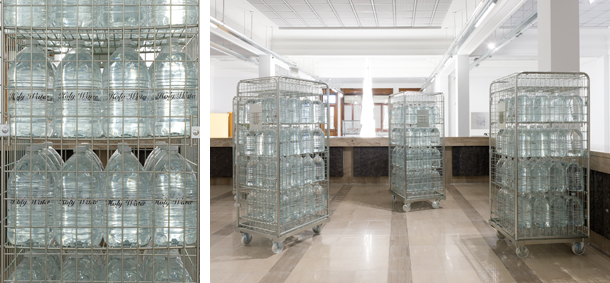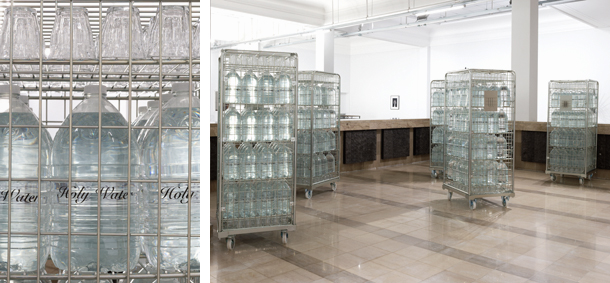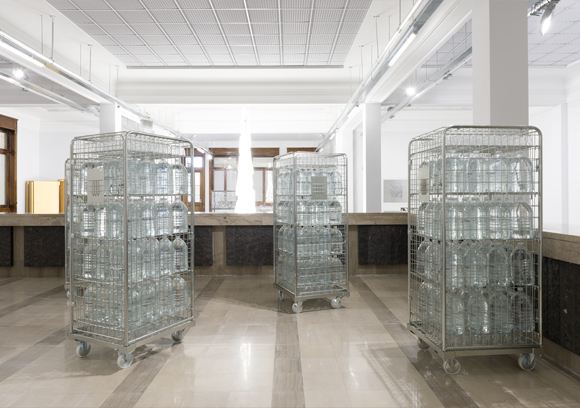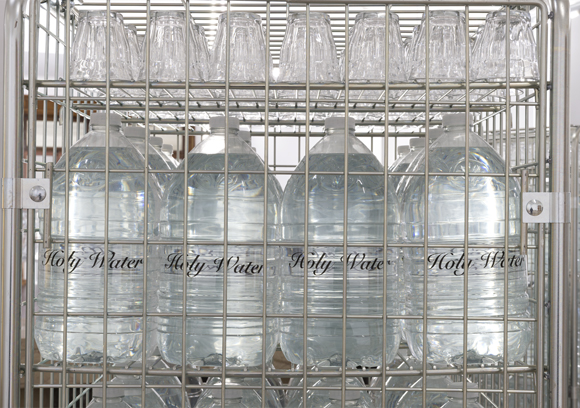| |
|
|
54.
| Commercial |
| |


2006-2016, trolleys, water bottles, glasses, size may vary
Exhibition view of Depth of Field, Labanque, 2016, Béthune.
Courtesy of the artist and Jane Lombard Gallery, New York.
Ed. of 5 + 1 A.P.

2006-2016, trolleys, water bottles, glasses, size may vary
Exhibition view of Depth of Field, Labanque, 2016, Béthune.
Courtesy of the artist and Jane Lombard Gallery, New York.
Ed. of 5 + 1 A.P.
Far from cynical, “Commercial” interrogates a taboo of modern life — society’s financing of religion —
by questioning the reaction of the public to the transformation of a sacred entity into a product of mass consumption.
Studio Fatmi, November 2016

Commercial
Exhibition view of Depth of Field, Labanque, 2016, Béthune.
Courtesy of the artist and Jane Lombard Gallery, New York.

Commercial
Exhibition view of Depth of Field, Labanque, 2016, Béthune.
Courtesy of the artist and Jane Lombard Gallery, New York.
|
|
|
|
|
|
|
L’installation Commerciale se compose de verres vides et de bouteilles d’eau empilées dans des chariots de manutention. Chacune des bouteilles portant une étiquette où figure, Holy Water : Eau bénite. Cette installation principalement constituée d’eau dite bénite brouille les pistes pour le public. Ce dernier est finalement pris dans un dilemme. Sommes-nous alors devant une œuvre sacrée ? Doit-on croire l’étiquette ou non ? Doit-on croire à la bénédiction de cette eau sous prétexte d’une inscription ? Ayant la liberté de croire ou non à la bénédiction de l’eau, la présence et l’interrogation du public offre finalement une nouvelle sacralité à l’installation.
Issue d’une série d’expérimentation débutée en 2005, mounir fatmi met à l’épreuve le jugement des spectateurs en les faisant s’interroger sur la limite entre sacré et profane. Avec cette installation, l’artiste reprend les codes de la consommation de masse afin de questionner l’économie du sacré. A la limite de l’objet promotionnel en tête de gondole, l’agencement de ces bouteilles d’eau bénite, leur accumulation, n’est pas sans rappeler l’iconographie du Pop Art, qui pour une certaine part dénonçait une société consumériste à la dérive.
Glaçons d’eau bénite performance de ce cycle de réflexion, associe l’alcool, troublant l’esprit, aux glaçons d’eau bénite. De cette association, mounir fatmi incite le spectateur à être partie prenante de l’expérience de déconstruction de frontières entre sacré et profane par l’acte de consommation. Comment émettre un jugement sur une œuvre destinée à être bu et qui, de surcroit, agit directement sur un esprit enivré par l’alcool contenu?
Sans cynisme, l’installation Commerciale met en exergue un sujet tabou dans la société moderne, le financement du culte dans la société contemporaine en interrogeant la réaction du spectateur en transformant l’essence sacrée en produit de consommation de masse.
Studio Fatmi, Novembre 2016.
|
|
The installation piece “Commerciale” presents empty glasses and bottles of water stacked in metal carts. On each bottle a label reads: Holy Water. Primarily composed of this so-called “holy” water, the installation confronts the viewer with a dilemma: Is this a work of sacred art? Should I believe the label or not? Should I believe that this water has been blessed simply because the label says so? The viewer is, of course, free to believe that the water has been blessed, or not. By virtue of the viewer’s presence, by virtue of the viewer’s interrogation, the work takes on a sacred mantle.
Since 2005 mounir fatmi has been designing experiments to test the public’s judgment by questioning the limit between the sacred and the profane. With “Commerciale,” he plays with the codes of mass consumerism in order to question the economy of sacred objects. Like some kind of odd end-aisle display, the stacks of holy water, their accumulation, harkens back to the iconography of Pop Art, itself devised in part to denounce a consumerist society veering off course.
“Holy Water Ice Cubes”, a performance piece that is part of this cycle of experiments, pairs alcohol – destined to cloud the mind – with ice-cubes made of Holy Water. With this experiment, fatmi invites the public to take an active part in deconstructing the borders between the sacred and the profane by performing a simple act of consumerism – drinking an ice-filled cocktail. How do we go about judging a work of art whose very purpose -- to be drunk and therefore to get us drunk -- is designed to impair our judgment?
Far from cynical, “Commercial” interrogates a taboo of modern life — society’s financing of religion — by questioning the reaction of the public to the transformation of a sacred entity into a product of mass consumption.
Studio Fatmi, November 2016.
Traduit du français par Hillary Keegin.
|
|
|
|